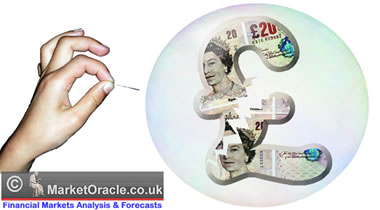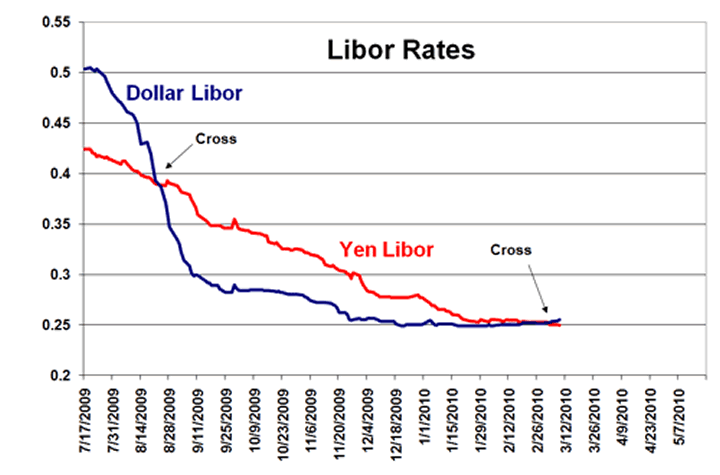The Four Stages of the Prospective U.S. Dollar Bull Market
Currencies / US Dollar Mar 14, 2010 - 03:22 PM GMTBy: Bryan_Rich
 Since last November, the dollar has climbed steadily against a basket of currencies — most notably against the euro. And based on my analysis, I think it’s just the early stages of this trend.
Since last November, the dollar has climbed steadily against a basket of currencies — most notably against the euro. And based on my analysis, I think it’s just the early stages of this trend.
In fact, for many of the reasons I’ve discussed in past Money and Markets columns, the weight of evidence suggests that we’ve likely seen the bottom in the dollar, with a multi-year bull market ahead.
That’s a high level view. But how are things shaping up on a shorter term outlook for the buck?
Let’s take a look at the four stages of this prospective dollar bull market and the immediate catalysts that should underpin its continued strength …
Stage 1: Marking the Bottom
My analysis of the seven-year cycles in the dollar index suggests a cyclical bottom was marked when the dollar rallied sharply off of its all-time lows in 2008 driven by the uncertainty surrounding a growing financial and economic crisis.
Back then, capital fled all areas of the world in search of safety. And the dollar represented a safe parking place.
Stage 2: Retracement Period
 |
| Investors shunned the dollar in search of bigger returns. |
Then we had the deep retracement of 2009. The global economy was showing signs of stabilization that encouraged global investors to start dipping their toes back in the water … i.e. taking risk again. That’s when capital was reversed out of the dollar in search of higher risk, higher return assets.
And just when sentiment was about as negative toward the dollar as it could possibly get, we were introduced to the first sign of collateral damage from the financial/economic crisis and the unprecedented government responses: Crumbling government finances.
The first wobbling sovereign nation, Dubai, quickly splashed water on the face of an increasingly optimistic global investment community. All of the sudden the theories of a V-shaped recovery became fractured by the realization that the widespread economic crisis could run deeper — a scenario that many had conveniently and complacently dismissed.
Stage 3: More Fear; More Risk Aversion
 |
| The dollar has benefited from weakness in the pound. |
In recent months much of the dollar strength has been driven by fears of a sovereign debt crisis. And much of that strength has come at the expense of the euro and the British pound.
We’ve seen the dominos of a potential sovereign debt crisis line up, as I detailed in last week’s column. The tremors that started in Dubai, quickly turned scrutiny toward Greece and the other weak spots in the euro zone (Portugal, Italy, Ireland and Spain). And it appears increasingly likely to soon weigh on the UK economy and the British pound.
As we know, currencies don’t operate in a vacuum. They’re valued relative to the value of another currency. So, given the recent concerns about the future of the euro and the increasing spotlight on the next sovereign debt domino, the UK, the dollar is benefiting primarily because of the weakness of other major currencies.
And there’s another developing situation that should offer more fuel for the dollar …
Stage 4: A Falling Yen
The euro, the British pound and the Japanese yen make up 83 percent of the dollar index, the often quoted proxy for the economic firepower of the U.S. dollar on a global level.
 |
| Japan’s deflation has taken a toll on the yen. |
While the pound and the euro have been under assault in recent weeks, the yen has been pushed and pulled in a tug of war: Strengthening as capital flows out of risky euro/yen and pound/yen positions, and weakening on the basis of fundamental divergences between the recovering U.S. economy and the deflation-burdened Japanese economy.
But the fundamental evidence has been clearly favoring the dollar relative to the yen for some time. What’s been lacking is a catalyst to send it higher.
Well, over the past two weeks we’ve finally gotten a clear catalyst to sell the yen against the dollar.
Catalyst for Yen Weakness
Back in August 2009, it became cheaper to borrow dollars (compared to borrowing yen) for the first time in sixteen years. In the chart below, you can see when the short-term interbank borrowing rate for dollars (Dollar Libor, the blue line) crossed below the equivalent interbank borrowing rate for yen (Yen Libor, the red line).

Source: Bloomberg
What looks like a minor rate differential can have a major impact on market perception. Since that cross occurred, the dollar lost as much as 13 percent against the yen as global investors began favoring dollars, as opposed to yen, to fund carry trades … i.e. selling dollars to fund the purchase of high yielding currencies.
But as of last week, this differential has crossed back, once again making the Japanese yen the cheapest currency in the world to borrow. And based on the diverging policy paths of the U.S. and Japanese central banks, this differential should continue to widen in favor of U.S. rates and dollar strength relative to the yen.
So given the ongoing crisis surrounding the euro, the vulnerability of the British pound from a continued spread of sovereign debt concerns AND the catalyst for a weakening yen, I’m expecting the dollar to continue its upward path against major currencies both in the short-term and longer-term.
Regards,
Bryan
This investment news is brought to you by Money and Markets. Money and Markets is a free daily investment newsletter from Martin D. Weiss and Weiss Research analysts offering the latest investing news and financial insights for the stock market, including tips and advice on investing in gold, energy and oil. Dr. Weiss is a leader in the fields of investing, interest rates, financial safety and economic forecasting. To view archives or subscribe, visit http://www.moneyandmarkets.com.
© 2005-2022 http://www.MarketOracle.co.uk - The Market Oracle is a FREE Daily Financial Markets Analysis & Forecasting online publication.



